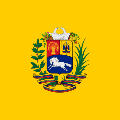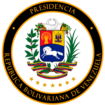
Back President de Venezuela AN رئيس فنزويلا Arabic رئيس ڤينيزويلا ARZ Президент на Венецуела Bulgarian President de Veneçuela Catalan Presidente de Venezuela CBK-ZAM Venezuelas præsidenter Danish Staatspräsident Venezuelas German Πρόεδρος της Βενεζουέλας Greek Presidente de Venezuela Spanish
This article appears to be slanted towards recent events. (January 2023) |
| President of the Bolivarian Republic of Venezuela | |
|---|---|
| Presidente de la República Bolivariana de Venezuela | |
 | |
 Presidential seal | |
| Style | Mr. President (Señor Presidente) His Excellency (Su Excelencia) |
| Member of | Cabinet |
| Residence | La Casona (es) |
| Seat | Miraflores Palace, Caracas |
| Appointer | Popular vote election |
| Term length | Six years, no term limits |
| Inaugural holder | Cristóbal Mendoza (First Republic) José Antonio Páez (State of Venezuela) |
| Formation | 13 January 1830 |
| Deputy | Vice President of Venezuela |
| Salary | 4,068 USD monthly[1] |
| Website | presidencia.gob.ve |
 |
|---|
|
|
The president of Venezuela (Spanish: Presidente de Venezuela), officially known as the President of the Bolivarian Republic of Venezuela (Spanish: Presidente de la República Bolivariana de Venezuela), is the head of state and head of government in Venezuela. The president leads the National Executive of the Venezuelan government and is the commander-in-chief of the National Bolivarian Armed Forces. Presidential terms were set at six years with the adoption of the 1999 Constitution of Venezuela, and presidential term limits were removed in 2009.[2]
The office of president in Venezuela has existed since the 1811 Venezuelan Declaration of Independence from the Spanish Crown; the first president was Cristóbal Mendoza. From 1821 to 1830, Venezuela was a member state of Gran Colombia, and the Venezuelan executive was absorbed by the Colombian government in Bogotá. When the State of Venezuela became independent from Gran Colombia, the office of the president was restored under José Antonio Páez. Every head of state of Venezuela since then has held the title of president.
During the 19th century, Venezuela suffered political turmoil and autocracy, remaining dominated by regional military dictators until the mid-20th century. Since 1958, the country has had a series of democratic governments, as an exception where most of the region was ruled by military dictatorships, and the period was characterized by economic prosperity.
The Venezuelan presidential crisis was a political crisis concerning the leadership and who holds the office remained disputed till 5 January 2023. It began when the opposition-majority National Assembly declared that incumbent Nicolás Maduro's 2018 re-election was invalid and the body declared its president, Juan Guaidó, to be acting president of the country.[3] However, support for Guaidó declined following a failed uprising attempt in April 2019.[4][5] Efforts led by Guaidó to create a transitional government were unsuccessful, with Maduro continuing to control Venezuela's state institutions.[6][7][8] The European Union still does not recognize Maduro as the legitimate president, threatening his government with further sanctions.[9] The interim government was dissolved in December 2022, when three of the four main political parties approved its dissolution to create a commission of five members to manage foreign assets, as the deputies sought a united strategy ahead of the presidential elections scheduled for 2024.[6]
- ^ "Shocking Gap Between Latin America's Presidential Salaries And Workers Minimum Wage". Latin Post.
- ^ Cite error: The named reference
termlimitswas invoked but never defined (see the help page). - ^ "El Tribunal Supremo de Justicia de Venezuela declara "inconstitucional" a la Asamblea Nacional y anula el nombramiento de Juan Guaidó como su presidente". Retrieved 29 January 2019.
- ^ * Rodríguez, Jesús A (8 May 2019). "We are going to take over the premises". Politico. Retrieved 10 May 2019.
In Venezuela, though the number of people who say they recognize Guaidó as the legitimate president has dwindled to about 50 percent since January, his approval remains much stronger than Maduro's abysmal 4 percent.
- Wyss, Jim (6 May 2019). "As Guaido's popularity in Venezuela begins to dwindle, what's next for the opposition?". Miami Herald. Chicago Tribune. Retrieved 10 May 2019.
... last week's failed military uprising and a spate of violent but fruitless demonstrations have some wondering if Guaido, and the opposition at large, have what it takes to oust Maduro ... A poll released Monday by Caracas-based Meganalisis found that Guaido's approval ratings dropped to 50 percent, down from 84 percent in January. He's still far more popular than Maduro whose approval rating is at 4 percent but the precipitous drop can't be ignored ...
- Casoni, Giampiero (7 May 2019). "Venezuela, il gradimento di Guaidò cala a picco: meno 34% in soli tre mesi". Ci Siamo (in Italian). Retrieved 10 May 2019.
The popularity of Juan Guaidò is in sharp decline and the 'liberator' of Venezuela seems to have exhausted the original propulsive thrust ... At the center of this drop in consensus, especially the failure (because of its failure) of the coup in recent weeks ...
- Wyss, Jim (6 May 2019). "As Guaido's popularity in Venezuela begins to dwindle, what's next for the opposition?". Miami Herald. Chicago Tribune. Retrieved 10 May 2019.
- ^ "Trump Weighs More-Muscular Venezuela Moves on Doubts Over Guaido". Bloomberg News. 6 December 2019. Retrieved 9 December 2019.
- ^ a b Armas, Mayela (31 December 2022). "Venezuela opposition removes interim President Guaido". Reuters. Retrieved 31 December 2022.
- ^ Rodriguez Montilla, Camille; Rueda, Manuel (30 December 2022). "Venezuelan opposition strips Guaidó of 'presidential' role". Associated Press. Retrieved 4 November 2023.
- ^ Herrera, Isayen; Turkewitz, Julie (22 December 2022). "Guaidó, the Face of Opposition in Venezuela, May Be on His Way Out". The New York Times. Retrieved 4 November 2023.
- ^ Emmott, Robin (6 January 2021). "EU no longer acknowledges Venezuela's Guaido as interim president". Reuters. Retrieved 7 January 2021.